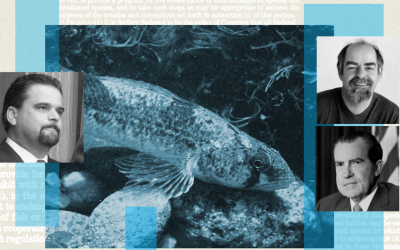Bone cave harvestman
Issues
Join the Movement

About
On June 2, 2014, American Stewards of Liberty, with the support of several Texas landowners and scientists, petitioned the U.S. Fish and Wildlife Service (Service) to delist the federally endangered Bone Cave harvestman (Texella reyesi) pursuant to Section 4 of the U.S. Endangered Species Act. The Bone Cave harvestman is a blind species (similar in appearance to a daddy longlegs) that is known to occur only in limestone caves and voids north of the Colorado River in Travis and Williamson Counties, Texas.
The Service originally listed the harvestman in 1988 based on extremely limited information. In light of new data collected over the last 26 years, it is now obvious that the listing was a mistake. The harvestman’s endangered status is insupportable, and the Service’s erroneous listing has caused significant economic harm to landowners and local governments.
Since the listing, the Service has assumed that surface disturbance above a void or cave caused destruction of the subsurface ecosystem. Throughout that time, the Service has required that developments be severely restricted in the vicinity of caves occupied by this arachnid. In fact, under Williamson County’s regional habitat conservation plan, landowners must set aside at least 8.5 acres around an occupied cave or pay up to $400,000 to develop within 50 feet of the cave entrance.
Discovering a previously unknown void during construction is a significant risk within the range of the harvestman. Dozens of projects under active construction, including important public highway projects, have been put on hold, sometimes for weeks, with contractors and equipment idled so that biologists could conduct surveys for the harvestman and coordinate with Service staff. A conservative estimate of what this listing has cost landowners, citizens and local governments is $150 million dollars.
Importantly, this delisting challenge needs to be made because it highlights a major flaw in the ESA listing process. The cave bug represents one of many species that have been added to the federally protected list without adequate data to support the action. These decisions should be challenged and reversed.
Executive Summary — Petition to Delist
The federally endangered Bone Cave harvestman (Texella reyesi) is a terrestrial karst invertebrate that occurs in caves and voids north of the Colorado River in Travis and Williamson counties, Texas. The U.S. Fish and Wildlife Service (USFWS) listed T. reyesi as endangered in 1988 on the basis of only five to six known localities that occurred in a rapidly developing area. Little was known about the species at the time, but the USFWS deemed listing was warranted to respond to immediate development threats. The current body of information on T. reyesi documents a much broader range of known localities than known at the time of listing and resilience to the human activities that USFWS deemed to be threats to the species.
Status of the Species:
• An increase in known localities from five or six at the time of listing to 172 today.
• Significant conservation is in place with at least 94 known localities (55 percent of the total known localities) currently protected in preserves, parks, or other open spaces.
• Regulatory protections are afforded to most caves in Travis and Williamson counties via state laws and regulations and local ordinances.
• Biologists continue to discover new, occupied localities and this trend is likely to continue as more areas are explored and more caves are discovered.
Review of Endangered Species Act Listing Factors
• Development activities on the surface may not result in the significant loss or degradation of habitat for T. reyesi as originally thought. Several examples of continued species persistence in developed areas include: Inner Space Caverns, Sun City caves, Three-Mile Cave, Four-Mile Cave, and Weldon Cave.
• Inner Space Caverns demonstrates that the species can persist in caves with frequent human visitation and may be more tolerant of related habitat modifications than originally believed.
• Recent studies suggest that fire ants may not present as significant or as lasting of a threat to the species as originally believed.
• The regulatory landscape includes a number of measures contributing to the conservation of the species outside of the protections afforded by the Endangered Species Act of 1973, as amended.
• The use of small voids or “mesocaverns” within the geologic formations known to support occupied caves mitigates the potential threat of climate change.
This petition provides several examples of other delisting actions by the USFWS in recent years, highlighting the rationale behind these prior actions and identifying similarities with the circumstances of T. reyesi. These provide historical evidence that the USFWS has delisted species on the basis of the original data in the listing rule being in error, as a result of new information demonstrating that the true range and population of the species is more expansive than previously known, and on the basis of species recovery, even if the criteria in published recovery plans were not fully met.
The Petitioners believe that delisting T. reyesi is warranted on the basis of both 1) significant conservation efforts achieving recovery, 2) significant increases in the number of known localities and the size of the species’ range, and 2) new information and analysis indicating the existence and/or magnitude of previously identified threats do not support a conclusion that the species is at risk of extinction now or in the foreseeable future.
Other Delisting Projects
American Burying Beetle
This species was listed in error. In 2020, the Service finalized its rule to down-list the species from endangered to threatened.
navasota ladies’-tresses
So much more information has become available since it was listed in 1982 demonstrating the species is not at risk of extinction.
yellow-billed cuckoo
The Obama administrations’ analysis of the genetic and habitat data was believed to be in error at the time of listing in 2014.
Delisting in The News
The Endangered Species Act At 50
The Endangered Species Act (ESA) was signed into law by President Richard Nixon on December 28, 1973. At 50 years old, the U.S. Fish and Wildlife Service (FWS) claims they currently protect 1,667 threatened or endangered species and have more than 100 species of...
U.S. Rep. Cloud’s Last Minute Amendment May Have Saved the Permian Basin
One amendment of utmost importance to the State of Texas was offered by Rep. Michael Cloud (R-TX-27), to specifically defund any attempt by the FWS to list the Dunes Sagebrush Lizard (DSL) as endangered or threatened. On June 29, 2023, the FWS announced the DSL is endangered and warrants protection under the Endangered Species Act (ESA).
1,609 Scientists: “There is No Climate Emergency”
It’s all a myth, according to 1,609 scientists who have formed the Global Climate Intelligence Group called CLINTEL. They are publicly saying “there is no climate emergency” and that they “strongly oppose the harmful and unrealistic net-zero CO2 policy” the Biden...
Our Mission & Approach
Our mission is to strengthen property rights and the liberties they secure. We have three pillars of focus;
First, to continue building the property rights Movement through
alliances with like-minded
organizations and policymakers to
advance strategies that will restore our Constitutionally guaranteed property rights.
Second, to equip citizens with the tools to educate and teach others why it is imperative that we the people own our nation’s natural resources to limit government over us.
Third, we must mobilize the people to help stop the policies eroding property rights at the local, state and federal level..
Your Donations Make a HUGE Impact
2021
- Campaigns 82%
- Research & Development 10%
- Management 6%
- Organization Growth 2%
2022
- Campaigns 82%
- Research & Development 10%
- Management 6%
- Organization Growth 2%
2023
- Campaigns 82%
- Research & Development 10%
- Management 6%
- Organization Growth 2%
A Letter from the Board
Proin eget tortor risus. Nulla porttitor accumsan tincidunt. Vivamus magna justo, lacinia eget consectetur sed, convallis at tellus. Nulla porttitor accumsan tincidunt. Vestibulum ac diam sit amet quam vehicula elementum sed sit amet dui. Sed porttitor lectus nibh. Donec rutrum congue leo eget malesuada. Mauris blandit aliquet elit, eget tincidunt nibh pulvinar a. Nulla quis lorem ut libero malesuada feugiat.
Vivamus suscipit tortor eget felis porttitor volutpat. Lorem ipsum dolor sit amet, consectetur adipiscing elit. Vestibulum ac diam sit amet quam vehicula elementum sed sit amet dui. Pellentesque in ipsum id orci porta dapibus. Vestibulum ante ipsum primis in faucibus orci luctus et ultrices posuere cubilia Curae; Donec velit neque, auctor sit amet aliquam vel, ullamcorper sit amet ligula. Donec rutrum congue leo eget malesuada. Vivamus magna justo, lacinia eget consectetur sed, convallis at tellus. Donec sollicitudin molestie malesuada. Vestibulum ac diam sit amet quam vehicula elementum sed sit amet dui.
Nulla quis lorem ut libero malesuada feugiat. Lorem ipsum dolor sit amet, consectetur adipiscing elit. Curabitur arcu erat, accumsan id imperdiet et, porttitor at sem. Vivamus suscipit tortor eget felis porttitor volutpat. Vivamus suscipit tortor eget felis porttitor volutpat. Donec sollicitudin molestie malesuada. Vestibulum ante ipsum primis in faucibus orci luctus et ultrices posuere cubilia Curae; Donec velit neque, auctor sit amet aliquam vel, ullamcorper sit amet ligula. Cras ultricies ligula sed magna dictum porta. Quisque velit nisi, pretium ut lacinia in, elementum id enim.
Curabitur arcu erat, accumsan id imperdiet et, porttitor at sem. Praesent sapien massa, convallis a pellentesque nec, egestas non nisi. Lorem ipsum dolor sit amet, consectetur adipiscing elit. Nulla porttitor accumsan tincidunt. Nulla quis lorem ut libero malesuada feugiat. Donec sollicitudin molestie malesuada. Pellentesque in ipsum id orci porta dapibus. Nulla quis lorem ut libero malesuada feugiat. Nulla quis lorem ut libero malesuada feugiat.
Request List Removal
If you have received a solicitation from American Stewards of Liberty and wish to have your name removed from our mailing list, click on the email address below – fill in your name, address and ask to be removed.
Removes@Eberle1.com
“Agriculture is our wisest pursuit, because it will in the end contribute most to real wealth, good morals, and happiness.”




